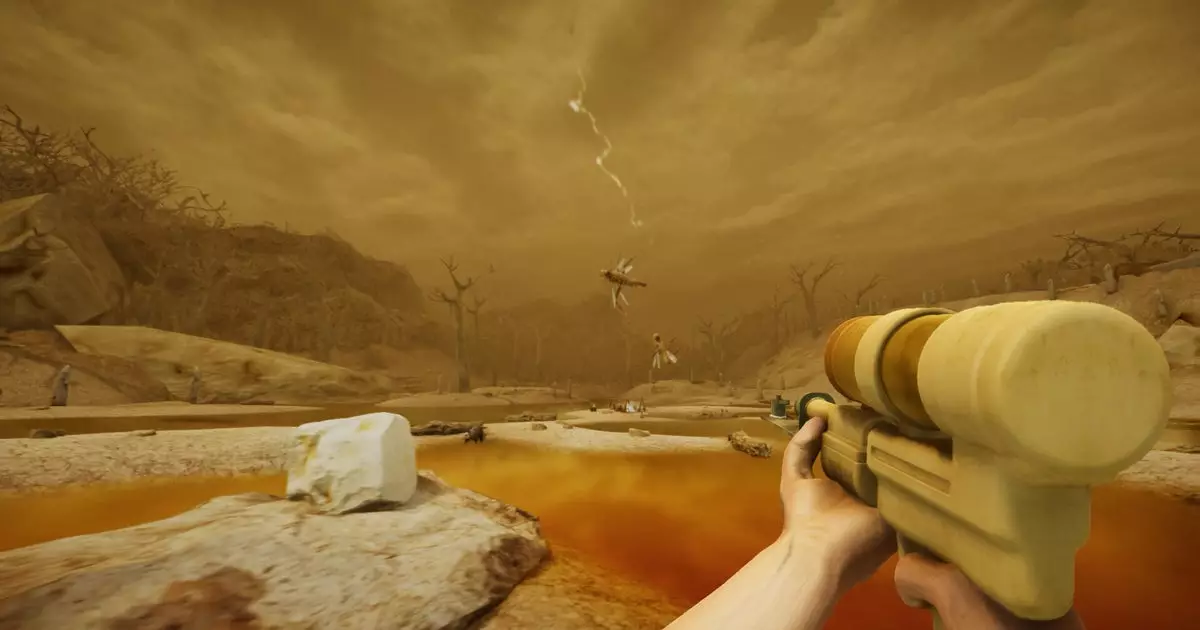The gaming landscape is an arena where imagination often runs wild, leading developers to explore uncharted territory. One such venture is “Urge,” an open-world survival shooter that boldly navigates themes that hover over the taboo. Central to its bizarre premise is a resource that most would shun in real life—urine. While many might scoff at the concept, the game’s innovative mechanics and intriguing lore invite a deeper exploration of its decidedly unusual approach.
“Urge” begins with a striking scenario: awakening from a car crash into a world enveloped in fog. This isn’t a serene mist conjured from classic literature; rather, it’s a dense, nauseating cloud saturated with an unholy essence. Players find themselves immersed in an environment that is steeped in both danger and absurdity. The fog, a central character in this tale, is no ordinary atmospheric effect but is instead a swirling concoction of ammonia, serving as a persistent reminder of the game’s peculiar foundation.
Upon investigation, it becomes apparent that this gameplay landscape is littered with pitfalls aplenty. Players are not just maneuvering through an open world; they are navigating a complex ecosystem where their actions directly impact their survival and the environment. The use of urine as a gameplay mechanic heightens the stakes and adds layers to the exploration.
At first glance, the idea of managing urine as a critical resource may seem ludicrous, yet the developers have imbued it with a unique complexity. Every drop counts in Urge’s gameplay. To survive, players must monitor not only their character’s health and sustenance but also the status of their bodily needs. Some might argue this gimmick distracts from the core essence of survival games, but it simultaneously challenges traditional norms of resource management.
The tension escalates when one considers how players must dispose of this resource responsibly. Improper disposal leads to the unsightly expansion of fog, summoning forth increasingly formidable enemies. This immediate feedback encourages players to process their actions through a lens of moral consequence, heightening awareness of their choices in a way rarely seen in typical survival shooters.
In Urge, the repercussions of careless management manifest vividly. Players encounter grotesque mutants, each bearing the marks of a world overcome by their bizarre addiction. From yellow spiders to chainsaw-wielding creatures donned in soiled hazmat suits, the threats are as varied as they are unsettling. The game doesn’t merely offer jump scares; it presents a visceral commentary on excess and mismanagement—metaphors that resonate with real-world issues like pollution and environmental degradation.
Moreover, the concept of urine meteors and lightning adds to the surreal charm of the universe. These phenomena amplify the game’s self-awareness and its commentary on the cyclical nature of resource manipulation. Each player’s action spirals into broader dynamics that impact not only their immediate survival but the game’s environment as a whole.
What sets Urge apart from traditional survival games is its thematic audacity. Instead of veering into the typical tropes of heroism and survival, it confronts players with absurdity and reflection. This compelling blend of humor and design invites players to engage seriously with the narrative and mechanics. The challenge lies not only in studying enemy patterns but also in contemplating how their own actions—embroiled in absurdity—affect the world around them.
Urge becomes a surprising metaphor for climate change and resource management. The act of pissing—deemed a mundane bodily function—is elevated to a mechanism of survival, serving as a creative vehicle for addressing critical global issues within the medium of video games. The blend of complexity, humor, and thought-provoking commentary makes the game more than a mere oddity in gaming; it becomes a cultural touchstone.
Urge stands as a testament to the unpredictable nature of game design, allowing developers to break away from convention and explore themes that might rattle more conservative players. The eccentric premise involves absurdity that encourages players to rethink their engagement with game mechanics and the larger messages they convey.
As we traverse this unconventional world, we are invited not just to survive but to thrive—albeit in a strange, sometimes stinky, landscape—where our decisions ripple through a hilariously grotesque ecosystem. For those brave enough to dive into Urge, there lies an unexpected wealth of insight nestled within the absurdity, challenging what it means to play, survive, and coexist.


Leave a Reply